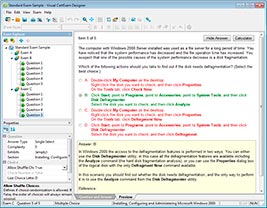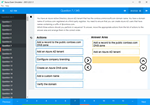Download Java SE 8 Programmer II.1z0-809.Dump4Pass.2021-06-06.207q.tqb
| Vendor: | Oracle |
| Exam Code: | 1z0-809 |
| Exam Name: | Java SE 8 Programmer II |
| Date: | Jun 06, 2021 |
| File Size: | 11 MB |
How to open TQB files?
Files with TQB (Taurus Question Bank) extension can be opened by Taurus Exam Studio.
Purchase
Coupon: TAURUSSIM_20OFF
Discount: 20%
Demo Questions
Question 1
Given the definition of the Vehicle class:
Class Vehhicle {
int distance;//line n1
Vehicle (int x) {
this distance = x;
}
public void increSpeed(int time) { //line n2
int timeTravel = time; //line n3
class Car {
int value = 0;
public void speed () {
value = distance /timeTravel;
System.out.println (“Velocity with new speed”+value+”kmph”);
}
}
new Car().speed();
}
}
and this code fragment:
Vehicle v = new Vehicle (100);
v.increSpeed(60);
What is the result?
- Velocity with new speed
- A compilation error occurs at line n1.
- A compilation error occurs at line n2.
- A compilation error occurs at line n3.
Correct answer: A
Question 2
Given:
IntStream stream = IntStream.of (1,2,3);
IntFunction<Integer> inFu= x -> y -> x*y;//line n1
IntStream newStream = stream.map(inFu.apply(10)); //line n2
newStream.forEach(System.output::print);
Which modification enables the code fragment to compile?
- Replace line n1 with:IntFunction<UnaryOperator> inFu = x -> y -> x*y;
- Replace line n1 with:IntFunction<IntUnaryOperator> inFu = x -> y -> x*y;
- Replace line n1 with:BiFunction<IntUnaryOperator> inFu = x -> y -> x*y;
- Replace line n2 with:IntStream newStream = stream.map(inFu.applyAsInt (10));
Correct answer: B
Question 3
Given the code fragment:
List<Integer> values = Arrays.asList (1, 2, 3);
values.stream ()
.map(n -> n*2) //line n1
.peek(System.out::print) //line n2
.count();
What is the result?
- 246
- The code produces no output.
- A compilation error occurs at line n1.
- A compilation error occurs at line n2.
Correct answer: A
Question 4
Given the code fragment:
public class Foo {
public static void main (String [ ] args) {
Map<Integer, String> unsortMap = new HashMap< > ( );
unsortMap.put (10, “z”);
unsortMap.put (5, “b”);
unsortMap.put (1, “d”);
unsortMap.put (7, “e”);
unsortMap.put (50, “j”);
Map<Integer, String> treeMap = new TreeMap <Integer, String> (new
Comparator<Integer> ( ) {
@Override public int compare (Integer o1, Integer o2) {return
o2.compareTo
(o1); } } );
treeMap.putAll (unsortMap);
for (Map.Entry<Integer, String> entry : treeMap.entrySet () ) {
System.out.print (entry.getValue () + “ “);
}
}
}
What is the result?
- A compilation error occurs.
- d b e z j
- j z e b d
- z b d e j
Correct answer: C
Explanation:
Map treeMap = new TreeMap((Comparator) new Comparator ( ) {@Overridepublic int compare (Integer o1, Integer o2) {return o2.compareTo(o1);}}); Map treeMap = new TreeMap((Comparator) new Comparator ( ) {@Overridepublic int compare (Integer o1, Integer o2) {return o2.compareTo(o1);}});
Question 5
Which two reasons should you use interfaces instead of abstract classes? (Choose two.)
- You expect that classes that implement your interfaces have many common methods or fields, or require access modifiers other than public.
- You expect that unrelated classes would implement your interfaces.
- You want to share code among several closely related classes.
- You want to declare non-static on non-final fields.
- You want to take advantage of multiple inheritance of type.
Correct answer: BE
Explanation:
Reference: https://books.google.com.br/books?id=nS2tBQAAQBAJ&pg=PT235&lpg=PT235&dq=You+want+to+share+code+among+several+closely+related+classes.&source=bl&ots=3oYOu2XXN-&sig=uVFS0KB15BqyEgghXnnjJSUdcrE&hl=pt-BR&sa=X&ved=0ahUKEwjlsKe-n6baAhVEhZAKHeiEDTgQ6AEIMDAB#v=onepage&q=You%20want%20to%20share%20code%20among%20several%20closely%20related%20classes.&f=false Reference: https://books.google.com.br/books?id=nS2tBQAAQBAJ&pg=PT235&lpg=PT235&dq=You+want+to+share+code+among+several+closely+related+classes.&source=bl&ots=3oYOu2XXN-&sig=uVFS0KB15BqyEgghXnnjJSUdcrE&hl=pt-BR&sa=X&ved=0ahUKEwjlsKe-n6baAhVEhZAKHeiEDTgQ6AEIMDAB#v=onepage&q=You%20want%20to%20share%20code%20among%20several%20closely%20related%20classes.&f=false
HOW TO OPEN VCE FILES
Use VCE Exam Simulator to open VCE files

HOW TO OPEN VCEX FILES
Use ProfExam Simulator to open VCEX files


ProfExam at a 20% markdown
You have the opportunity to purchase ProfExam at a 20% reduced price
Get Now!



